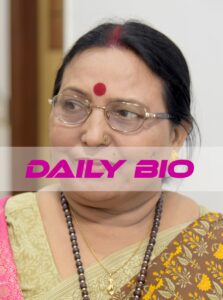
Sharda Sinha, born on October 1, 1952, in Bihar, India, was a celebrated folk and classical singer known for her soulful renditions in Maithili and Bhojpuri languages. Often referred to as the “Nightingale of Bihar,” she gained widespread acclaim for her traditional songs like “Vivah Geet” and “Chhath Geet.” Throughout her illustrious career, she received numerous accolades, including the Padma Shri in 1991 and the Padma Bhushan in 2018. Sharda Sinha’s legacy continues to inspire many in the world of Indian folk music.
Also Read: Tabitha Gatwiri Biography
Sharda Sinha Biography
Sharda Sinha, born on October 1, 1952, in Hulas, Bihar, India, was a renowned Indian folk and classical singer. She was widely known for her soulful renditions in Maithili and Bhojpuri languages. Sharda Sinha earned the title “Nightingale of Bihar” for her significant contributions to regional music.
She completed her education at Magadh Mahila College and later pursued a master’s degree in music from Prayag Sangeet Samiti, Allahabad. She also earned a B.Ed. from the College of Education in Samastipur. Her academic background laid a strong foundation for her musical career.
Sharda Sinha began her career by singing Maithili folk songs. Her debut album, “Dwar Ke Chekai Nega,” released in 1971, marked the beginning of her journey in the music industry. She gained widespread recognition with her song “Kahe Toh Se Sajna” from the Bollywood movie “Maine Pyar Kiya” in 1989.
Throughout her career, Sharda Sinha received numerous accolades. She was awarded the Padma Shri in 1991 and the Padma Bhushan in 2018 for her contributions to Indian music. She also received the Sangeet Natak Akademi Award in 2000.
Sharda Sinha’s work primarily focused on traditional Maithili and Bhojpuri songs. She was known for her performances during Chhath Puja, a significant festival in Bihar. Her songs like “Vivah Geet” and “Chhath Geet” became an integral part of the cultural fabric of Bihar.
She was married to Dr. Braj Kishore Sinha, a professor at the Science College of Samastipur. They had two children, Anshuman Sinha and Vandana Sinha Bharadwaj, both of whom followed in their mother’s footsteps and became folk singers.
Sharda Sinha’s legacy continues to inspire many in the world of Indian folk music. Her dedication to preserving and promoting traditional music forms has left an indelible mark on the cultural heritage of India. She passed away on November 5, 2024, but her music and contributions will always be remembered.
Sharda Sinha Age
Sharda Sinha was born on October 1, 1952. As of November 2024, Sharda Sinha age is 72 years.
Sharda Sinha Net Worth
As of 2024, Sharda Sinha’s net worth is estimated to be between ₹16 crore and ₹42 crore. Her primary sources of income included album sales, royalties, and performances at cultural events, especially during the Chhath Puja season.
Sharda Sinha Husband Name
Sharda Sinha was married to Dr. Braj Kishore Sinha, a professor at the Science College of Samastipur. They had two children, Anshuman Sinha and Vandana Sinha Bharadwaj, both of whom are also folk singers. Dr. Braj Kishore Sinha passed away on September 22, 2024, due to a brain hemorrhage.
Sharda Sinha Son Name
Sharda Sinha’s son’s name is Anshuman Sinha.
Sharda Sinha Daughter Name
Sharda Sinha’s daughter’s name is Vandana Sinha Bharadwaj.
Sharda Sinha Family
Sharda Sinha’s family played a significant role in her life and career. She was married to Dr. Braj Kishore Sinha, a respected professor at the Science College of Samastipur. Their marriage was a partnership that supported her musical journey. Dr. Braj Kishore Sinha was known for his academic contributions and was a pillar of support for Sharda throughout her career.
They had two children, Anshuman Sinha and Vandana Sinha Bharadwaj. Both children inherited their mother’s passion for music and became folk singers themselves. Anshuman Sinha, her son, followed in her footsteps and contributed to the preservation of traditional music. Vandana Sinha Bharadwaj, her daughter, also embraced the musical heritage, adding her voice to the rich tapestry of Indian folk music.
The Sinha family was deeply rooted in the cultural traditions of Bihar. They often participated in local festivals and cultural events, with Sharda Sinha’s music being a central feature. The family’s commitment to preserving and promoting regional music was evident in their active involvement in the community.
Despite their busy schedules, the family maintained a close-knit bond, often coming together to celebrate festivals and special occasions. Sharda Sinha’s legacy, supported by her family’s dedication, continues to inspire many in the world of Indian folk music. Their collective efforts have left an indelible mark on the cultural heritage of Bihar and beyond.
Sharda Sinha Career
Sharda Sinha’s career in music is a testament to her dedication and passion for Indian folk traditions. Born in Hulas, Bihar, on October 1, 1952, she grew up surrounded by the rich cultural heritage of her region. Her early exposure to folk music ignited a lifelong passion that would define her career.
Sharda Sinha began her professional journey in the early 1970s, focusing on Maithili and Bhojpuri folk songs. Her debut album, “Dwar Ke Chekai Nega,” released in 1971, marked the start of her illustrious career. She quickly gained recognition for her soulful voice and authentic renditions of traditional songs.
Her breakthrough came with the song “Kahe Toh Se Sajna” from the Bollywood movie “Maine Pyar Kiya” in 1989. This song brought her national fame and showcased her ability to blend folk music with mainstream cinema. Despite this success, Sharda remained committed to her roots, continuing to perform and record traditional songs.
Throughout her career, Sharda Sinha received numerous accolades. She was awarded the Padma Shri in 1991 and the Padma Bhushan in 2018, two of India’s highest civilian honors, recognizing her contributions to music. She also received the Sangeet Natak Akademi Award in 2000, further cementing her status as a leading figure in Indian folk music.
Sharda Sinha’s work was deeply connected to the cultural practices of Bihar. She was particularly known for her performances during Chhath Puja, a significant festival in the region. Her songs, such as “Vivah Geet” and “Chhath Geet,” became an integral part of these celebrations, resonating with audiences across generations.
In addition to her musical achievements, Sharda Sinha was an educator. She taught music at various institutions, sharing her knowledge and passion with students. Her role as a teacher allowed her to influence the next generation of musicians, ensuring the preservation and continuation of traditional music forms.
Also Read: Major General Olufemi Oluyede Biography
Sharda Sinha’s career was characterized by her unwavering commitment to folk music. She successfully brought regional music to a broader audience while maintaining its authenticity. Her legacy continues to inspire musicians and music lovers alike, highlighting the enduring power of traditional music in contemporary times.
Sharda Sinha Early Life
Sharda Sinha was born on October 1, 1952, in Hulas, a small village in the Samastipur district of Bihar, India. Growing up in a culturally rich environment, she was surrounded by the traditional music and folklore of her region. Her parents, deeply rooted in the local traditions, played a significant role in nurturing her early interest in music.
From a young age, Sharda was drawn to the sounds of Maithili and Bhojpuri folk songs. Her family encouraged her musical pursuits, recognizing her natural talent and passion. She often participated in local cultural events and festivals, where she had the opportunity to perform and hone her skills.
Sharda’s formal education began in her village, but her passion for music led her to pursue further studies in the field. She attended Magadh Mahila College in Patna, where she completed her undergraduate studies. Her academic journey continued at Prayag Sangeet Samiti in Allahabad, where she earned a master’s degree in music. This formal training provided her with a strong foundation in both classical and folk music traditions.
During her college years, Sharda Sinha’s talent began to gain recognition. She participated in various music competitions and cultural programs, earning accolades for her performances. Her dedication to preserving and promoting traditional music was evident even in her early years.
Sharda’s early life was marked by a deep connection to her cultural roots and a commitment to her musical education. These formative experiences shaped her career and laid the groundwork for her future success as a celebrated folk singer. Her journey from a small village in Bihar to becoming the “Nightingale of Bihar” is a testament to her talent, hard work, and unwavering dedication to her craft.
Sharda Sinha Wikipedia

- Sharda Sinha: Born on October 1, 1952, in Bihar, India, she was a renowned folk and classical singer.
- Early Life: Sharda Sinha grew up in Hulas, Bihar, surrounded by rich cultural traditions.
- Education: She studied at Magadh Mahila College and earned a master’s degree in music from Prayag Sangeet Samiti.
- Career Start: Her debut album, “Dwar Ke Chekai Nega,” was released in 1971.
- Bollywood Fame: Gained national recognition with “Kahe Toh Se Sajna” from “Maine Pyar Kiya” in 1989.
- Awards: Received the Padma Shri in 1991 and the Padma Bhushan in 2018.
- Chhath Puja: Known for her performances during the Chhath Puja festival in Bihar.
- Family: Married to Dr. Braj Kishore Sinha, with two children, Anshuman and Vandana.
- Legacy: Left an indelible mark on Indian folk music, inspiring many.
- Death: Passed away on November 5, 2024, at the age of 72.

1 thought on “Sharda Sinha Biography”